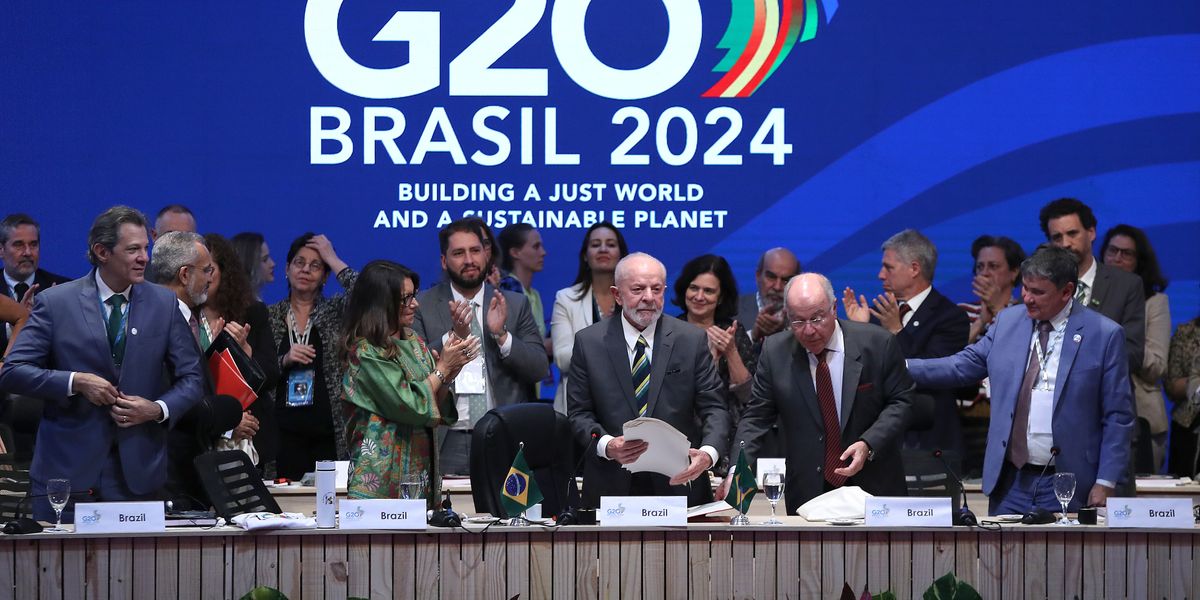Despite pushback from the United States delegation, finance ministers at a meeting of the G20 countries in Rio de Janeiro on Thursday agreed on the need to develop a global taxation system in which the richest in the world are taxed at a higher rate—potentially unlocking hundreds of billions of dollars annually to help close the international wealth gap. Ahead of the G20 Summit scheduled for November, which Brazilian President Luiz Inácio Lula da Silva’s government will host, the finance officials met this week to discuss economic issues and ultimately agreed to start a “dialogue on fair and progressive taxation, including of ultra-high-net-worth individuals.”
The Lula government pushed for a proposal by progressive economist Gabriel Zucman, who serves as a G20 adviser and is a professor of economics at University of California, Berkeley. Zucman’s proposal calls for a minimum 2% tax on the fortunes of the world’s roughly 3,000 wealthiest billionaires, which could raise approximately $250 billion globally per year. “With full respect to tax sovereignty, we will seek to engage cooperatively to ensure that ultra-high-net-worth individuals are effectively taxed,” the ministers wrote in a declaration that was viewed by Politico.
“Finally, the richest people are being told they can’t game the tax system or avoid paying their fair share. Governments have for too long been complicit in helping the ultra-rich pay little or zero tax.” The agreement to discuss higher taxes for the rich was reached despite objections from Germany and the U.S., whose treasury secretary, Janet Yellen, said that “tax policy is very difficult to coordinate globally.”
“We don’t see a need or really think it’s desirable to try to negotiate a global agreement on that,” Yellen said at a press conference before the ministers met Thursday evening. “We think that all countries should make sure that their taxation systems are fair and progressive.”
Global Cooperation on Taxation
Although the agreement only states that countries will discuss the need for the wealthy to pay their fair share to help fight poverty and fund public education and other services, the global anti-poverty group Oxfam International said the meeting represented “serious global progress.”
“For the first time in history, the world’s largest economies have agreed to cooperate to tax the ultra-rich,” said Susana Ruiz, tax policy lead for Oxfam. “Finally, the richest people are being told they can’t game the tax system or avoid paying their fair share. Governments have for too long been complicit in helping the ultra-rich pay little or zero tax. Massive fortunes afford the world’s ultra-rich outsized influence and power, which they wield to shield, stash, and supersize their wealth, undercutting democracy and widening inequality.”
An Oxfam study released ahead of this week’s meeting found that the richest 1% of people in the world increased their fortunes by $42 trillion over the past decade, while taxation fell to “historically” low rates. Ruiz called on G20 heads of state to “go further than their finance ministers” at the G20 Summit in November “and back concrete coordination: agreeing on a new global standard that taxes the ultra-rich at a rate high enough to close the gap between them and the rest of us.”
“Brazil has kickstarted a truly global approach to tax the ultra-rich. But the work is just beginning and international cooperation is crucial,” said Ruiz, adding that the task of ensuring the wealthiest people in the world are taxed fairly must not be left up to the Organization of Economic Cooperation and Development (OECD)—“the club of mostly rich countries.”
Zucman expressed hope that the agreement between the G20 finance ministers marked a “historic” moment, and called it “an important step in the right direction.”
“Our proposal for a common minimum tax on billionaires is now on the map. G20 finance ministers have started to engage with it—and there is no going back,” said Zucman. “In its declaration, the G20 finance ministers commit to important preliminary steps. They need to do more and commit to a coordinated minimum tax on the super-rich. We know that it is practically doable—we know the solutions exist. And I’m confident, because there is overwhelming popular demand everywhere to get there.”
“The status quo, in which the biggest winners from globalization are allowed to enjoy the lowest tax rates, is simply not sustainable,” said Zucman. The findings released this week by Oxfam highlighted polling that “consistently” found people across the world support raising taxes on the richest individuals. “Eighty percent of Indians, 85% of Brazilians and 69% of people polled across 34 countries in Africa support increasing taxes on the rich,” said the group. “Nearly three-quarters of millionaires polled in G20 countries support higher taxes on wealth, and over half think extreme wealth is a ‘threat to democracy.’”
The Independent Commission for the Reform of International Corporate Taxation (ICRICT) applauded the agreement and called on the G20 to “go further in [the] fight to tax the rich.”
“To take this forward, G20 should support work on this at the Framework Convention on International Tax Cooperation currently being negotiated at the United Nations,” said Jayati Ghosh, co-chair of the ICRICT.
A U.N. committee is scheduled to submit “terms of reference” regarding a tax convention framework in August, and a final vote on the framework is expected by the end of 2025.






